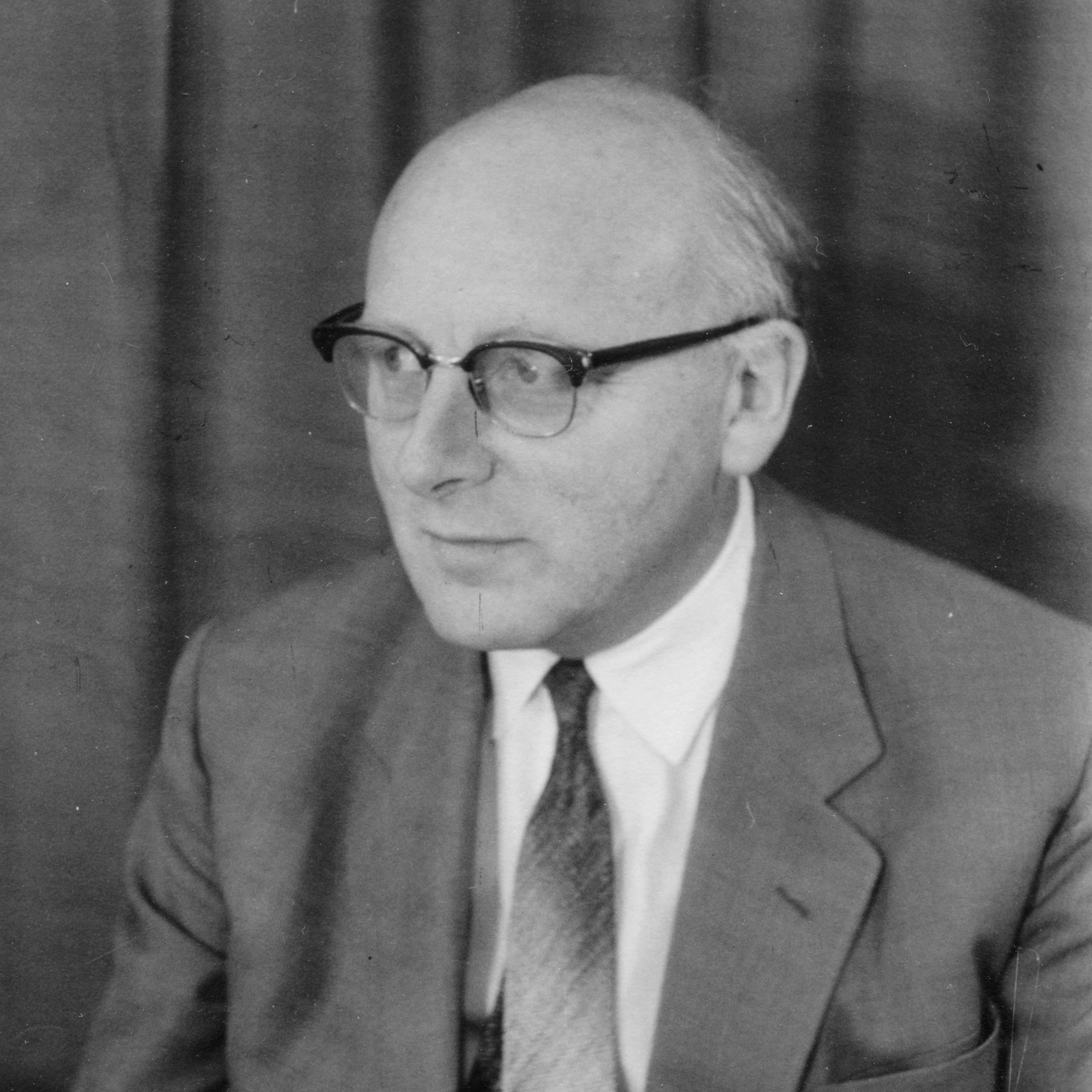- Surname:
- Baeyer
- First name:
- Walter Ritter von
- Era:
- 20th century
- Field of expertise:
- Neurology
Psychiatry
Social psychiatry - Place of birth:
- München (DEU)
- * 28.05.1904
- † 26.06.1987

Baeyer, Walter Ritter von
German reform-minded psychiatrist with a leaning towards anthropology.
Life
Walter Ritter von Baeyer (1904-1987) was born in Munich to a family of scholars. He studied medicine in Munich, Berlin and Heidelberg, where he participated in Kurt Beringer’s drug experiments and graduated in 1927 with a doctoral dissertation on the psychology of crippled children and youths (Zur Psychologie verkrüppelter Kinder und Jugendlicher). Between 1928 and 1933, he worked as an assistant physician in Breslau and Heidelberg and as a research fellow at the genealogical department of the German Institute for Psychiatric Research in Munich under Ernst Rüdin. Von Baeyer’s father, a professor of medicine in Heidelberg, was dismissed from his position in 1933 because he had grandparents of Jewish origin. Nonetheless and despite being barred from gaining further academic qualifications, such as for a professorship, von Baeyer decided to stay “in [his] home country” (1977: 17 f.). He was married to Marie Wanda von Katte (1911-1997) since 1936 (Kretz 2004: 559). The couple had three children. Von Baeyer worked as a medical officer in the German Army from 1935 to 1945, serving in Poland, France and Russia during WW2 (from 1941 onwards as a consulting psychiatrist). In 1944, another attempt to gain the formal qualification for professorship (Habilitation) under the supervision of Oswald Bumke was again stopped by the National Socialist German Students’ League.
After WW2, von Baeyer was appointed senior physician at the Psychiatric and Neurological Clinic of Nuremberg Municipal Hospital. He held this post for ten years, during which time he completed his professorial thesis on the mental effects of spotted fever typhus (1947). In his book on contemporary psychiatric shock treatment (Die moderne psychiatrische Schockbehandlung, 1951), von Baeyer claimed that then common insulin or electroconvulsive shock therapy had causal and in part psychologically explicable effects on affective disorders (1951: 141-152; cf. v. Bayer & Grobe 1947; v. Baeyer 1977: 22). In 1955, he was named successor to Kurt Schneider as professor at the Psychiatric Clinic of Heidelberg University. There he developed the first initiatives to reform German psychiatry, together with Karl Peter Kisker and Heinz Häfner (cf. Rotzoll 2012).
Advocating for psychiatric reform in Germany
In Heidelberg, von Baeyer developed a concept of psychiatry drawing on dialogical anthropology (Der Begriff der Begegnung in der Psychiatrie, 1955). His theory of schizophrenia emphasized social factors in both the pathogenesis and the treatment of this condition. According to him, aspects such as “encounter”, “estrangement” and “identity” are crucial: “When psychiatry is solely based on what is statistically quantifiable, and key terms that could open up the gates to entire areas of human existence are considered dispensable ‘empty phrases’, it becomes sclerotic and rigid. Our discipline can only partly, but never fully, be based on precise measuring and counting methods, which may either be seen as a deficit or as a special challenge” (1977: 25; our translation).
Von Baeyer was chairman of the action committee for improving the services for the mentally ill, appointed by the German Association for Private and Public Welfare in 1959 (Brink 2010: 422 f.). His 1966 study Psychiatrie der Verfolgten (Psychiatry of the Persecuted), published together with Häfner and Kisker, included an anthropological concept for evaluating traumatized Nazi victims and influenced the German legislation on compensation (Beyer 2014: 29). Von Baeyer was on the editorial board of the journal Der Nervenarzt (1950-1975) and chairman of the World Psychiatric Association (1966-1971). As head of Heidelberg University’s psychiatric clinic, he was heavily involved in the 1970/71 struggles with the leftist activist group Socialist Patients’ Collective (cf. Pross 2016). He became emeritus in 1972. In 1975, he co-initiated a new treatment and research facility in Mannheim, the Zentralinstitut für Seelische Gesundheit.
Walter Ritter von Baeyer died in Heidelberg in 1987.
Awards
1971: Grand Order of Merit of the Federal Republic of Germany
1976: Golden Kraepelin Medal (awarded by the Max Planck Institute for Psychiatry).
Literature
Aschenbrenner, R., W. v. Baeyer (1944): Epidemisches Fleckfieber. Eine klinische Einführung. Stuttgart: Enke.
Beyer, C. (2014): “Ko-Existenz” im “Trainingslager” - Karl Peter Kisker und die Frühphase der Hannoveraner Sozialpsychiatrie 1966-1972. In: Sozialpsychiatrische Informationen 44, (1), pp. 28-32.
Brink, C. (2010): Grenzen der Anstalt: Psychiatrie und Gesellschaft in Deutschland 1860-1980. Göttingen: Wallstein.
Häfner, H. (1987): Prof. Dr. Walter Ritter von Baeyer - in memoriam. In: Nervenheilkunde 6, pp. 224-225.
Kretz, H. (2004): Psychiatrie im Umbruch. In: Deutsches Ärzteblatt 101, (12), pp. 559-560.
Pross, C. (2016): Wir wollten ins Verderben rennen. Die Geschichte des Sozialistischen Patientenkollektivs Heidelberg. Köln: Psychiatrie-Verlag.
Rotzoll, M. (2012): Die Entstehung der „Sozialpsychiatrischen Klinik Heidelberg“ in den 1960er Jahren - Sozialpsychiatrie in Heidelberg. In: Jahrbuch des Heidelberger Geschichtsvereins 17, S. 133–148.
Von Baeyer, W. (1928) Zur Psychologie verkrüppelter Kinder und Jugendlicher. Ein Beitrag zur Kenntnis ihrer geistigen und seelischen Entwicklungsweisen. In: Zeitschrift für Kinderforschung 34, (1), pp. 229-292.
Von Baeyer, W., W. Grobe (1947): Psychopathologische Erfahrungen mit der Elektrokrampfmethode. In: Archiv für Psychiatrie und Nervenkrankheiten 179, (1/2), S. 163-233.
Von Baeyer, W. (1951): Die moderne psychiatrische Schockbehandlung. Stuttgart: Thieme.
Von Baeyer, W. (1955): Der Begriff der Begegnung in der Psychiatrie. In: W. von Baeyer: Wähnen und Wahn. Ausgewählte Aufsätze. Stuttgart: Enke 1985, pp. 127-140.
Von Baeyer, W., K.P. Kisker, H. Häfner (1966): Psychiatrie der Verfolgten. Berlin, Heidelberg, New York: Springer.
Von Baeyer, W. (1966): Beurteilung der geistigen Tauglichkeit. (Beiträge zur Wehrpsychiatrie, Vol. 1). Bonn: Bundesministerium der Verteidigung.
Von Baeyer, W., W. v. Baeyer-Katte (1973): Angst. Frankfurt on the Main: Suhrkamp.
Von Baeyer, W. (1977): Walter Ritter von Baeyer. In: L. Pongratz: Psychiatrie in Selbstdarstellungen. Bern: Huber, pp. 9-33.
Von Baeyer, W. (1979): Wähnen und Wahn. Ausgewählte Aufsätze. Stuttgart: Enke.
Samuel Thoma
Photo: Unknown / Copyright: Universitätsarchiv Heidelberg, UAH Pos I 04322.
Referencing format
Samuel Thoma (2016):
Baeyer, Walter Ritter von.
In: Biographisches Archiv der Psychiatrie.
URL:
biapsy.de/index.php/en/9-biographien-a-z/84-von-baeyer-walter-ritter-e
(retrieved on:23.07.2025)
